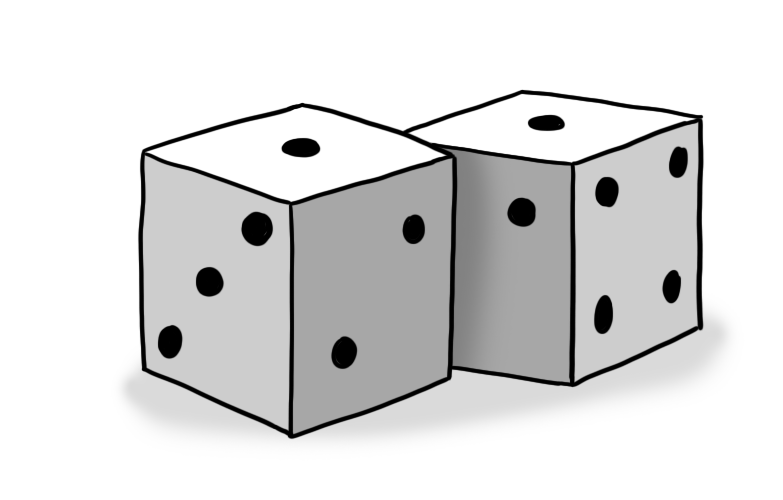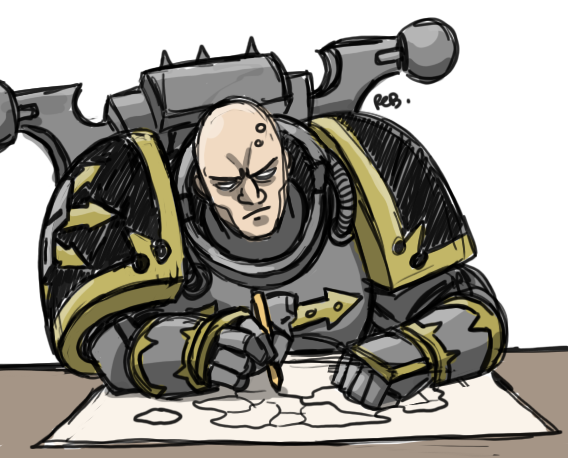Welcome back to Game Design Discourse where Jamn our Game Design Discourse series we join James M Hewitt from Needy Cat Games and our own Edwin “Lupe” Moriarty for chats about game design theory and practice. James worked for Games Workshop as part of the Citadel studio rules team, before becoming a founding member of the newly created Specialist Games Team. He now operates Needy Cat Games. Edwin is a freelance game designer who has worked, among many other projects, with Needy Cat Games on Hellboy: the Board Game.
Lupe: So I thought we could talk today about randomness.
James: Certainly. Can we say hello to whoever’s transcribing this as well?
Lupe: Yeah, absolutely. I don’t know who that will be, but probably Greg. Hi, Greg. Sorry, Greg. (editor: It was Mike, Greg was busy)
James: Good luck.
Lupe: Godspeed. Yeah.
James: Just just cut out everything I say. It will make more sense usually.
Lupe: So I thought we should talk about randomness because we kind of touched on briefly last time, but there’s a lot to be said about it, like how randomness is used or what randomness is used for in games.
James: Yeah, sure.

Lupe: So there has to be a point to randomness, right? Because it’s in everything – there’s dice or cards or some random number generator in almost every game. So I guess the big question is: why?
James: (laughing) So okay, I’m assuming that’s not a rhetorical question and you’d like me to give some detail now.
Lupe: I’d like you to dive straight in and then talk for the next 20 minutes, and I can say nothing if that’s ok.
James: We’ve had conversations before, I can tell. So, why is randomness important in game design? Obviously not all games have randomness, right? Chess is the classic example. That’s that style of game chess-style games where there is perfect information. The players know exactly what is happening on the other side. Every action you make has a predictable outcome, and the game becomes very much a head-to-head battle of wits. And that’s fine.
But as anyone who’s played a lot of chess or Go or Othello can attest, the games are very dry, aren’t they? They’re very, uh, they lack flavour there. A crunchy cracker with no cheese. I think the thing that is missing for those for me personally, for what I like to get out of the game, is little moments of surprise. That is a thing which a lot of players enjoy in a game, especially games that are more thematic or narrative, little elements of surprise that give the game tension.
They give it pace, they give it excitement, they have unexpected moments, and there are two ways you can do that. Something that you’re aware of that your opponent is not, hidden information, is one. That could be a hand of cards you can play – you have a special ability that is only revealed at a certain point. And of course there is randomness. What randomness means is you can’t plan too far ahead. You can have your fantastic strategy, but as soon as it starts happening some things will work and some things won’t. And so it keeps your decision space fairly compact. As a player you’re only thinking a couple of turns ahead, maybe, and then waiting to see what happens. It brings in that drama, that surprise, that excitement.
Lupe: You’re talking about randomness there as almost like a concealing element. Where you can’t necessarily predict future events, you can’t necessarily see the outlier. Everything’s happening because there is that random number generation that you can’t predict.
James: Yes, absolutely.
Lupe: But also randomness as a tension builder is interesting because I think randomness can build tension both in the moment of the generation of randomness, i.e. will I roll the number that I need to succeed, but also in the sense of building up tension across a game.
James: Definitely
Lupe: Will the rolls broadly go in my favour? Can I manipulate the odds to help me? And each dice roll adds to that sort of building tension. Thinking of it a different way: is there something to randomness as a leveller?
James: Yeah, absolutely. Yeah, that’s a big one, actually, isn’t it? Let’s take, for example, Blood Bowl. It’s a game which I’ve played for a long time. I’ve been lucky enough to have a chance to work on it for a bit. It’s a very well known game, and it’s a game that is famously luck based to a degree, in that there are lots and lots of dice rolls. Everything involves a dice roll and the potential outcomes of a dice roll are very broad and can have utterly catastrophic or utterly triumphant consequences.
So a single dice roll can have a big impact on the game. And what I think is interesting is that when you have two players of Blood Bowl of different skill levels, the player who is more experienced, more skilled, will know the correct order in which to do things, and they will have a better chance of winning. But it is not a sure thing, because the dice can go against them, can open up opportunities for their opponent. And even though they might make all the actions in the right order, they might, you know, read the risk level of the board completely correctly and do everything in the most sensible order, and then they could just roll double skulls, use their reroll – double skulls again. As we all know, if you’ve played Blood Bowl, that happens about one in three times.
And then their opponent gets an opening and they can score. So, yeah, it can absolutely be a leveller. It can bring out surprising moments, in games and there’s an anecdote: When I was researching for Warhammer Quest: Silver Tower, I did a lot of reading up on what people enjoyed about the original Warhammer Quest, and no one ever mentioned the rules. You know, no one mentioned “Oh, I love the fact that it was three plus to hit”. What they talked about was the surprising moments that came out of randomness. And it was a thing where the balance would suddenly tip in a surprising way. So your amazing high-level barbarian could get killed by a snotling, and that would be really funny. And it would be a memorable moment. People will still be talking about years later, and that’s kind of the same sort of thing, right? And even though it’s not player-versus-player imbalance, it gives a surprising outcome. You can’t necessarily predict what’s going to happen.
Lupe: Actually you mention fun and random chance bringing out fun events, and that’s interesting because I think there’s a fine line between randomness producing moments of fun and randomness being used as fun by designers.
James: Yeah, absolutely.
Lupe: I think finding the specific line between those two is actually quite challenging. So for you, when does randomness stop being fun?

James: I’ve done a lot of reading on the subject. I’m not going to be an expert, but I think the prevailing wisdom is that for randomness to feel satisfying and fun in a game, there needs to be an element of predictability. I need to be able to say, well, there’s a good chance that this strategy will work, so I’m going to try it. What you don’t want is something where we’ll try a thing, and it will be completely random as to whether it works or not, and therefore something silly could happen. And it could make us laugh for a moment, but if that happens across the entire course of the game it gets very tiresome. And I’ve certainly played a few games where the randomness is very much front and centre. It can feel like you’re just barely a participant – you’re just kind of along for the ride, and the game is playing itself.
Have you heard of the concept of, different types of randomness? And I don’t know how familiar you are with this, and I probably should explain it anyway.
Lupe: You probably should because it’s not just us here.
James: So there are various ways of categorising randomness and one of the interesting ways I’ve seen doing it… there’s a fantastic video which I imagine you could link in the article, by a game designer called Jeff Engelstein. He’s got a lot of fun games. He’s also written a lot on board game design theory. He does a segment called Game Tech on the Dice Tower podcast and used do to lots of like articles and things. He’s basically got a really good brain for this kind of thing.
He did a talk at I think one of the game developer conferences about three flavours of randomness and talks about white noise, brown noise and pink noise.
Lupe: “White, Brown, and Pink: The Flavours of Randomness”.
James: It’s like Neopolitan ice cream. So what you have first is white noise. White noise is complete static, it’s completely random. So if, for example, you had… I’m gonna butcher this analogy, but he does a much better job of it. If every single decision you make is completely random, you roll a D6 every turn and that’s what your unit can do this turn, that is white noise randomness because you have no control over it. There’s no predictability.
Brown noise randomness is where there is a smaller change turn by turn. So maybe you have six different things your unit can do. And, you pick one of them on the first round, and on one the second round, you roll the dice and on a 1 to 2 you do the thing before that on the chart, on a 3 to 4, you do that thing there, and on a five or six you do it afterwards. So it’s quite random, but you can predict within that six to be one of those three. So it’s a much more narrow band of randomness.
Pink noise is one that is most in line with how humans work. Pink noise is there is a high chance of a predictable outcome, but a low chance of an unpredictable outcome. The best example of it is a two D6 roll where you have the bell curve, right? So for those that aren’t familiar with this when you roll two dice and add the results together and you plot those on a graph, the most frequently occurring result is seven and eight or six are slightly less frequent, and so on and so on until 2 and 12 are massively unlikely, a 1 in 36 chance of running into 2 or 12. If you have a table of outcomes and the most likely one is on a seven, then that will happen most of the time and the ones at the top and bottom of the chart will happen more rarely. And that’s how you get randomness which is predictable, but can still throw in exciting, interesting moments. Exploding dice is a great example of pink noise randomness.
Lupe: Mm, I think a really good example of that bell curve in action, like in a very raw state, is Powered by the Apocalypse [a ruleset and design philosophy used to design roleplaying games]. The mechanic resolution for that is roll two D6 and add them together and see what you get. And the 7 to 9 result bracket is the success, but at a cost. And that’s very clearly the one that’s intended to happen most often.
James: Yeah, and that plays into the whole nature of it – the design of the game is that it wants you to fail but it wants failure to be interesting. It wants failing to happen a lot, but in a way which pushes the game forward, right?
Lupe: Yeah, absolutely. And I think that that’s a perfect encapsulation of that pink randomness. So when we talk about randomness that’s predictable but occasionally surprising, there’s got to be some element of us thinking about agency and randomness, which sounds like an odd concept.
James: (Laughing) Absolutely, I like it. So I think the thing is… so I’m going to talk about this from a wargames point of view because, you know, Goonhammer wargames. Big focus, right? So when you put your army on the table, you have an idea in your head of what it is going to do, right? “This is my hard hitting combat unit.” So I think this is going to go and win some fights up close. “This is my artillery.” This is going to pepper the enemy from afar or whatever else. So as a player you make decisions going into it and then randomness is applied. There’s an outcome. You want that outcome to generally be predictable based on the choices you’ve made. But you also, even though you won’t necessarily admit it as a player, you want it to go wrong sometimes. Because if it went right every single time the game would be boring.
But it means you want to have that agency the other way of categorising agency. Randomness in game design theory is input versus output randomness. Input randomness is a thing where you hang on… I want to make sure I get this right around. So I’m stalling. Uh huh. So I often get this wrong way around. Help me out. Do you know which one’s which?
Lupe: So input randomness is a random limit that serves as input to the player’s decision that then determines the outcome, output randomness is a player’s decision prompts randomness in the outcome.
James: Exactly. So the example would be: I am playing 40K and I’m in the shooting phase. I’m shooting an enemy unit. I pick my target. I make my decision there, and then I roll the dice to see what happens. That is output randomness because the randomness is occurring after the decision has been made. However, input randomness could be… Warhammer Quest: Silver Tower is a great example of this, actually, because at the start of your turn, you roll your action dice and you then spend those dice on different actions. So higher numbers that you choose make for better actions.
Warhammer Quest actually has input then output because sometimes the action you use is an attack, which uses output randomness to generate the outcome of that roll, and so you’ll often find one nested within the other. But I think it’s interesting to see the way the agency plays in there because you either have agency before or after randomness. Bad randomness is where you have no agency, either before or after.
Lupe: Yeah, that’s fair. It’s a different way of approaching, isn’t it, in terms of input versus output random, particularly when it comes to wargames. One of the things that I often hear when I talk to people who play 40K is the sense of “feel good” or “feel bad”. Did this game “feel good”, or did this game “feel bad”? One of the things that is most interesting about that is that a lot of games that have a lot of output randomness have a tendency to be randomly feel bad. Whereas I would say my experience with games that have a lot of input randomness, like Chain of Command or Infinity, tend not to have a lot of the feel bad in the same way. When you feel bas it’s because you’ve mucked up the decision you made, not when the game has mucked up your decisions.
James: That is a big difference. When you think of it from a player experience point of view… I think player experience is a really important thing to think of when you’re designing a game. A lot of new designers focus on what’s happening on the table. They think about the stats and the numbers, the interactions. But I think the real win is to think about how your players are feeling, interacting, whatever else. And so I think what’s important is you think about input randomness, where you know the randomness that has happened when you make your decision. That means that you have massively more agency in the exact outcome, and so that can feel a lot more satisfying when you lose. You feel like you lost because you made the wrong decisions rather than because you rolled badly.
But output randomness where you make the call then roll the dice…. that is a lot quicker to resolve. And so ithere is a good reason why you see it in games, because what you don’t want is to get the players to a position of analysis paralysis where they have their randomness and then what happens next is entirely on them. I think a lot of players can freeze in that moment and think “Oh, well, hang on, what is the right thing to do?“
Lupe: If we look back to what we were saying about what randomness is for as well, is there a good reason to use output randomness? Randomness doesn’t necessarily work in the same way when used as input and as output.
James: Yeah. It doesn’t work as a leveller, really.
Lupe: That build up of tension, making choices and then seeing if they work, is very much an output randomness thing.
James: It’s interesting because I think it follows the same split as the classic euro game versus, uh, I don’t want to say Ameritrash because I think it’s a really derogatory term, but “American style”, heavily thematic board games, because there’s been a split that exists in the board game world for ages, but not so much in the wargaming world.
You have these sort of dry economic or political board games, which has been the German-style of board game for many years, which generally has massively larger amounts of input randomness. So the game tends to be quite sedate. You know, you might draw a tableau of cards and then pick from those cards. Whereas the more thematic games tend to favour output randomness because it leads to surprising moments of drama and people who are big fans of euro games hate them because they cant strategize easily.
Lupe: What I think is interesting is for me the wargames that I find most satisfying to play personally tend to be those that do a good balance of input and output randomness. Chain of Command is one I mentioned and it is a classic one where there’s a lot of input randomness in how you organise what you’re doing, where your forces are going. But there’s a lot of output randomness in “do they actually succeed in what they’re doing?“
James: I think what I like with that is it splits the input and output between dice and cards. Yeah, so you draw cards. You have a hand of cards… I haven’t played one for a while, but you have a hand of cards? Don’t you determine which elements of your force you can use with cards?
Lupe: So no, Chain of Command is the one where you roll a set of dice and the dice have actions assigned to the numbers.
James: I’m thinking of Command and Colours!
Lupe: You are thinking of Command and Colours but it does a similar thing. And also, what’s the card game? The World War Two card game where your units are in the deck of cards. It’s sort of a card building game.
James: Ah yes, there was North Africa and Normandy were the two ones. Undaunted!
Lupe: Undaunted! Yes. Well, you’re curating your input randomness, and to a certain extent, curating your output randomness. And I think that that was a really interesting element of that as well, because it’s a sort of weird hybrid of the two where you’re constraining and controlling your output randomness or your input randomness, but at different stages. Right?
So we talked about randomness as a whole bunch of different things. We talked about when randomness isn’t fun… when is randomness just a bad idea in a game. When should you have less?
James: I think where I don’t like randomness is when you have compound randomness. Where it’s a random thing upon a random thing. So rolling on a table and the outcome of the table tells me to go and roll a stat test and the outcome of the stat test makes my opponent roll the dice and so on and so forth. I feel that when you have too many random elements butting up against each other, it just makes it difficult. It removes that predictability. And what it leads to is number crunching mid game. I think that when you have to sit and work out the odds of a thing in the middle of a game, it can slow down, it can reduce the tension and pace. Having it happen occasionally can be really cool for the one or two big moments in a two hour game where you have to stop and weigh the odds and then make a decision that that can be really cool. If you’re doing it every turn, then that just makes the game feel like sludge, right? It just drags.
Lupe: So is this just the idea of randomness for the sake of randomness? Because that sense of spiralling chaos, I think something is quite fun.
James: Yeah. I think everything has its place, and I think it can be fun. It comes down to how much it happens.
Lupe: I’m just thinking it’s interesting because I’m thinking about Adeptus Titanicus where reactor explosions cause these rippling chains of unlikely events. Those kind of elements are often very memorable. But they are often the accumulation of a whole run of decisions, that then has a spiralling chaos.
James: Correct. So I think the thing with that is because it only happens a handful of times in a game it works. I’m happy with the way that works, because I mean that all came from the intention of having every Titan death feel massive and impactful because it should. It’s a Titan, you know. So the whole reason the damage system works as it does, you kind of got three levels, right? You got the point where your titan is taking damage and you’re ignoring it because your Void Shields are up and you’re laughing and you feel utterly invincible, and then you start taking hull damage and/or structural damage. And you think, okay, I’m not as invincible as I was, but I’m still big and tough. And then bits start falling off your Titan, weapons start exploding, and you eventually fall over into a building and your reactor goes up and the latter elements of that are random. Whereas the earlier elements are very predictable. And so, like you say, it builds, it builds up and ends up in this big thematic explosion literally and metaphorically. I think that’s really satisfying. That, to me, feels like good randomness. Not that I’m biased at all.
Lupe: No, no, of course. It’s interesting you say that, though, because the idea that as your titans sort of grinds into destruction, you have the building randomness and a sort of escalation… I think that’s really interesting. Not necessarily randomness as punishment, but the sense of incentivising people to avoid randomness or getting to avoid randomness because they’re using more agency, giving you a greater sense of control. It gives people an incentive in play, doesn’t it?
James: Yeah. Absolutely. Absolutely and I think randomness can have many purposes. It can act as a leveller. As we said, it could be a thing where it creates story moments, you know, it creates tension, but I think, yeah, it can be a reward. It can reward players when you do something risky and you pull it off the sense of the dopamine rush from that is generally massive, right? It’s the way I play games like Blood Bowl, Blitz Bowl, Dreadballl… Any sports games! I always go for the risky play because I know that it probably won’t work, but if it does, I will feel amazing.
Lupe: I believe a few years ago, I got you to sign an Adeptus Titanicus kit for a friend for a Christmas present, and you in fact wrote “If you’re not pushing your reactors, you’re not doing it right.”
James: Absolutely correct. Entirely correct. That is the only way to play.
Lupe: I think that’s a good lesson to learn.
I think in competitive circles where controlling or constraining is often seen as an advantageous thing that can be a good lesson to learn. In 40K, there’s a big focus on the idea of very consistent weapons. Fixed damage weapons at one point at least were always considered better because you know what you’re going to get out of them. And there was that predictability to it.
James: Absolutely. And I understand that because if you’re playing the game competitively and that’s the thing that you are pushing towards, then you want things to be predictable, right? You don’t mind if you lose out on the peaks if you get rid of the troughs.
Lupe: And it’s the same as when you’re playing Magic: The Gathering and you’re playing relatively seriously and you’re playing like Modern format or whatever. You’re gonna have multiples of most of your cards if not all of them. You’re not going to have one odd card floating in your deck, because the whole goal here is to get those cards out reliably so you can pull off the things that you need to do. But that does seem very interestingly at odds with a lot of what we’ve talked about. Randomness as tension, randomness as a source of fun, and yet competitive play is often about avoiding it.
James: Yeah, I think that that speaks to the way that you and I play games because we tend to play games more for the narrative and the theme, right? I think that’s true of both of us. And that’s not to say that competitiveness isn’t important.
You what’s really interesting? If you look at the history of Warhammer 40,000, for example, there have been times when it has been pushed more competitively and away from more narrative play, and times when it’s gone the other way. It’s always interesting looking at the design work that comes out of those times. It feels more or less chess like. There was a point when, I think in fourth or fifth edition of the game, it felt like there was a real desire to make it as predictable as possible. In order to make it so that it was a serious battle of wits between competitive players.
And then other times… 8th Edition Warhammer, Age of Sigmar…. so this is Warhammer rather than 40K. But it had random charge ranges, random this, random that, random everything. It just shows there are different ways of doing things. And I think when I talk about player engagement, I’m often talking about and thinking about the experience of the average player, whereas someone who is a competitively minded player will have different considerations. They’ll be getting satisfaction not from the randomness and the drama. And that’s the thing. They’ll be getting randomness and the fact that they enjoy, you know, winning games.
It goes back to a guy called Richard Bartle who in the 1990s did some categorisation work. It’s called Bartle’s Taxonomy of Gamers. He talks about the four different types of gamer, and there’s been other work on it since then. But it’s like: killers want to win; explorers want to play with the system; socialisers want to hang with their friends; achievers who want to feel like they’ve achieved a thing. A good game caters to as many of those as possible. And I think what we’ve talked about mainly is less for the killers, but more for the others. Different things apply in different cases.
Lupe: Yeah. Why don’t we wrap up there? And then perhaps next time, we can chat about different types of players?
James: Great idea, that’s fantastic. That will be a good topic to talk about.
Have any questions or feedback? Drop us a note in the comments below or email us at contact@goonhammer.com.




